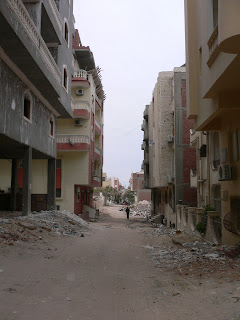 I've shared some of the highlights and unique experiences. Now I want to give you few glimpses into my everyday life.
I've shared some of the highlights and unique experiences. Now I want to give you few glimpses into my everyday life.At grocery store
There's a 24/7 mini-market downstairs of my apt. They sell juice, milk, candy, chocolate, toothpaste, phone cards, and 6-litre water jars, my main staple from the shop. The cashier typically doesn't have change, the case in all shops, so I need to have an exact amount. If I don't, no big deal, I pay the rest the next time I drop by. When I have picked the products I want to purchase, the following conversation often follows.
- Salaam aleikum. I will take these (juice, water, and some candy).
-Cigarettes?
-No, thanks.
-Phone cards?
-No, thanks.
-Bubble gum?
-No, thanks. (If the clerk doesn't have enough change, I'll get bubble gum instead).
-Cigarettes? (again)
-No, I don't smoke. Halas (This is all).
The clerk shows the price with his calculator. He then picks up a plastic bag, and I say, 'La shokran' (no thanks). This happens every time, even though he knows me. It is very hard for a local person to comprehend why someone doesn't want a plastic bag. It's equally hard for me to accept one, thanks to my Western mind, brainwashed with environmetal consciousness.
The plastic bags were forbidden in the Red Sea governorate in August, because they are a major environmental issue. The governor gave one month's transition period, but now, half of year later, there is no change. The shop clerks, especially at grocery stores, are obsessed with handing out bags, and one is not enough. There's a bag for every few items. A multitude of plastic bags are stuck in the airport fence. A plastic bag flying in the wind is such a common sight that it has actually been nominated the unofficial national bird of Egypt.
Laundry
One of my colleagues has a washing machine, but it's more convenient to drop dirty clothes at landry, located downstairs of my place. The price for washing and ironing is identical for any item, 1 Egyptian pound (15 cents) from a sock to bedsheet. The laundry is dried outside, where the brisk sea wind and hot sun dries it in few hours. The clothesline hangs between two tile pillars of an abandoned high-rise building site. The clothes are ready to be picked the next day. They are neatly folded and packed – you guessed it – in a plastic bag, and the price tag is stapled on top.
Transportation
There are downtown-hotel buses, microbuses and taxis. My favourite mode of transportation is microbus, a.k.a. yalla-bus. ('yalla' means 'let's go'). They stop anywhere you wawe your hand, and a two-kilometre trip costs 0,5-1 pound, depending on how local you behave. When you enter, you tell the driver your destination. There are no street names, so you just name the nearest shop, hotel, or restaurant where you want to get off, such as Vodafone or McDonalds. You can also just jump in, and when you want to get off, holler: 'Älägäm hena' (Stop here.) In Arabic there are no polite forms, such as 'please' or 'could you...' You just tell, 'do this'.
Taxis can be a pain in the neck. They are cheap (10-minute ride equivalent to 1,3 euros), but they don't always know the way, and sometimes try to trick you. They may claim you only gave them 50 piasters (half a pound) instead of 50 pounds, and sometimes they refuse to drive you if you are going only for few kilometres, or bargain too low price. No big deal though, because there are over 1000 taxis around, about 50 % of the car population. Normally you need to negotiate the price beforehand, but I've learned the local way: state the destination, and pay whatever seems appropriate. There are hardly any complaints. The drivers blast Arabic music (talk about a cultural experience), but they also smoke while they drive, as 90% of men everywere, inside the buses, cafes, and apartments.
Ah, and the taxis love to honk the horn. The drivers have developed a diverse language using the horn. It means, depending on the context, 'I'm free, jump in', 'Watch out', I'm about to pass you by', 'You idiot/move faster'. A newly-weds' escort is also announced by beeping the horn. At dark horn-honking is replaced with flapping the far lights on and off. Nearly not all drivers use driving lights at dark, because they think they disturb others. The emergency lights come handy at dark, especially when the car needs to slow down at bumps. I've also gove native, both by honking the horn and using emergency lights, whenever appropriate.
Ei kommentteja:
Lähetä kommentti